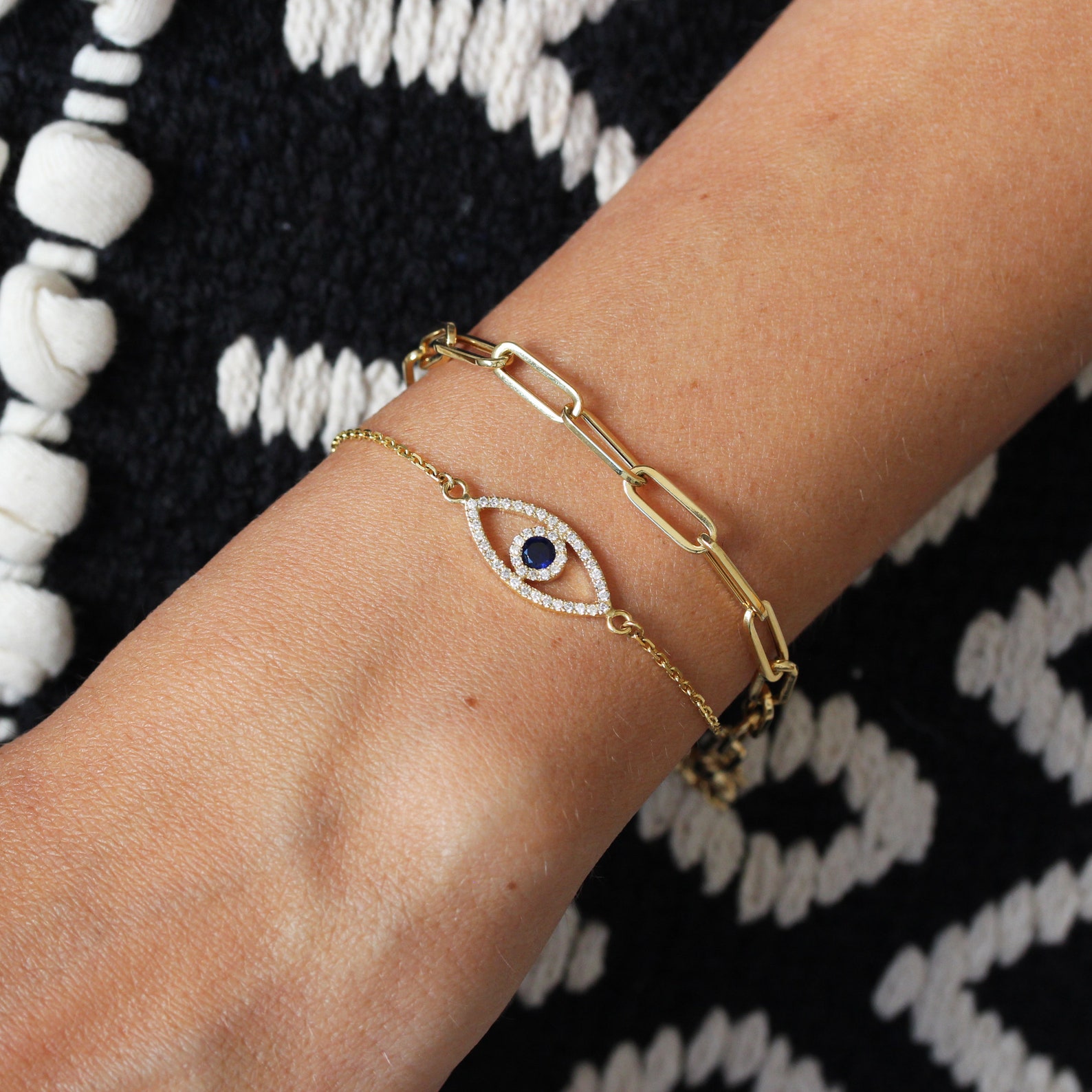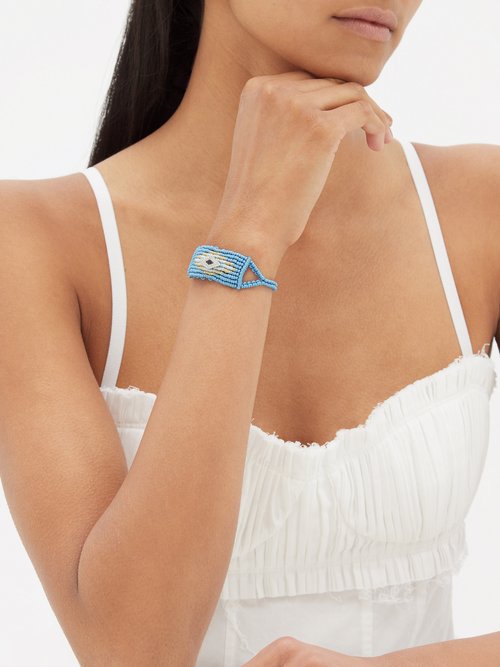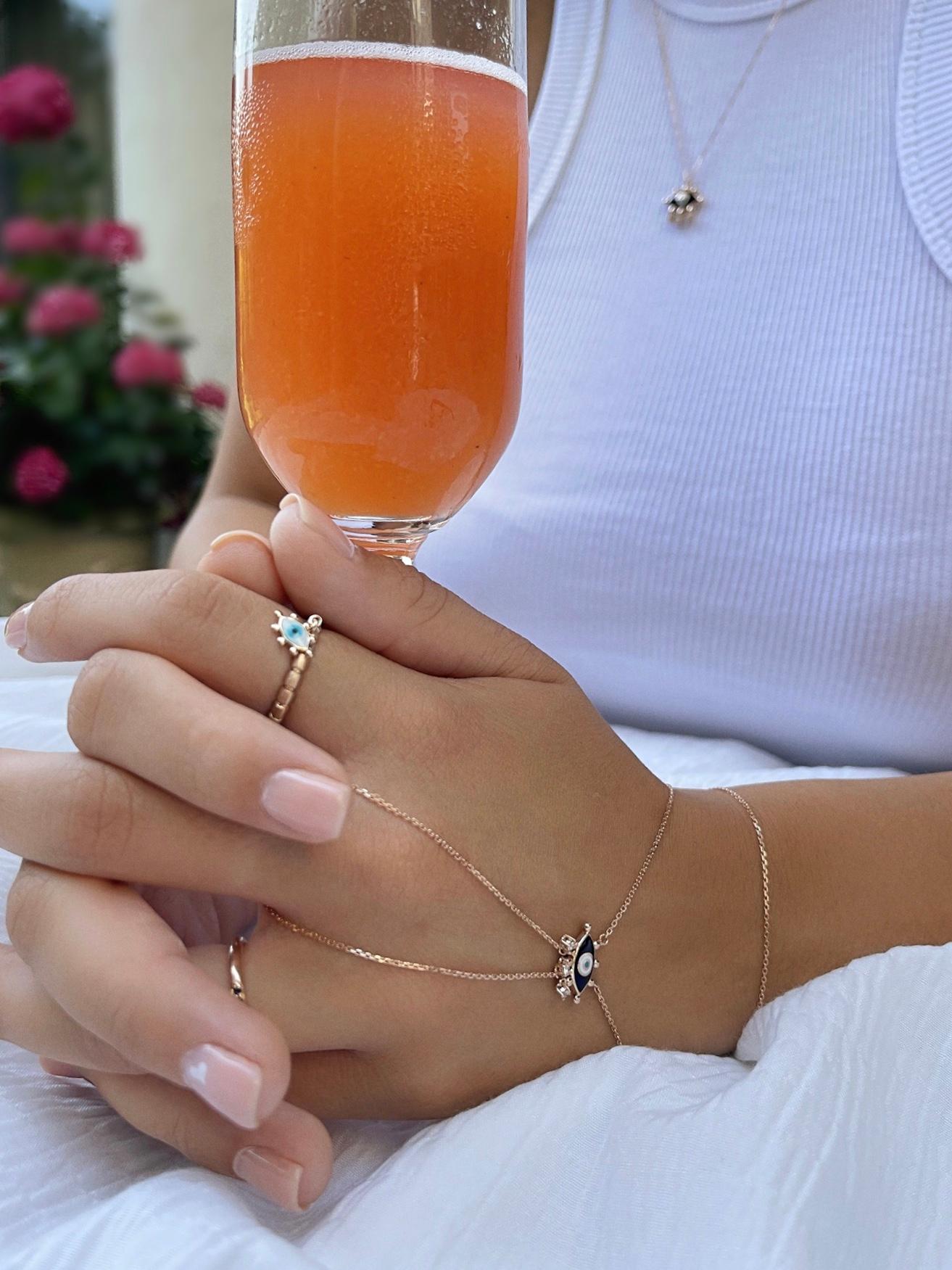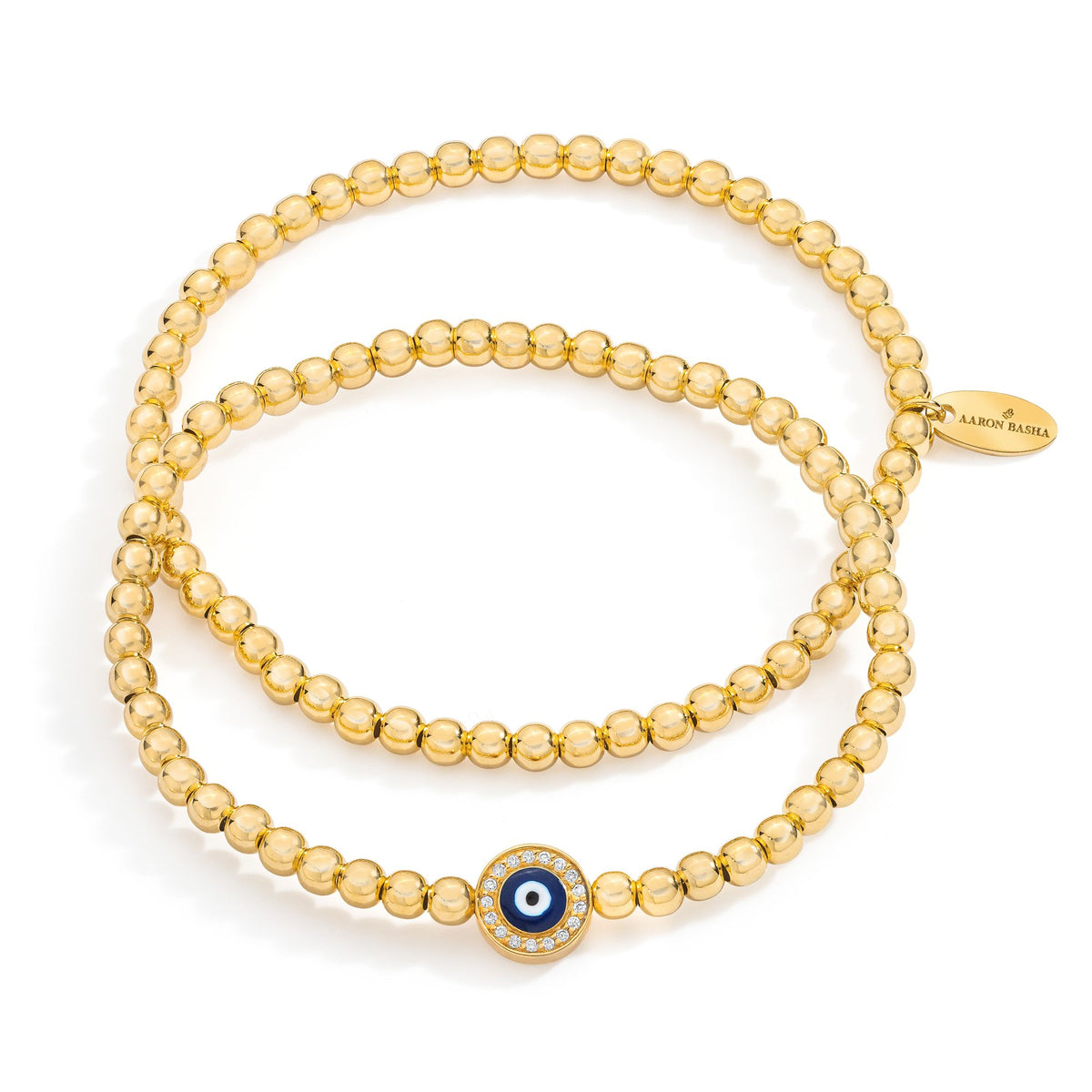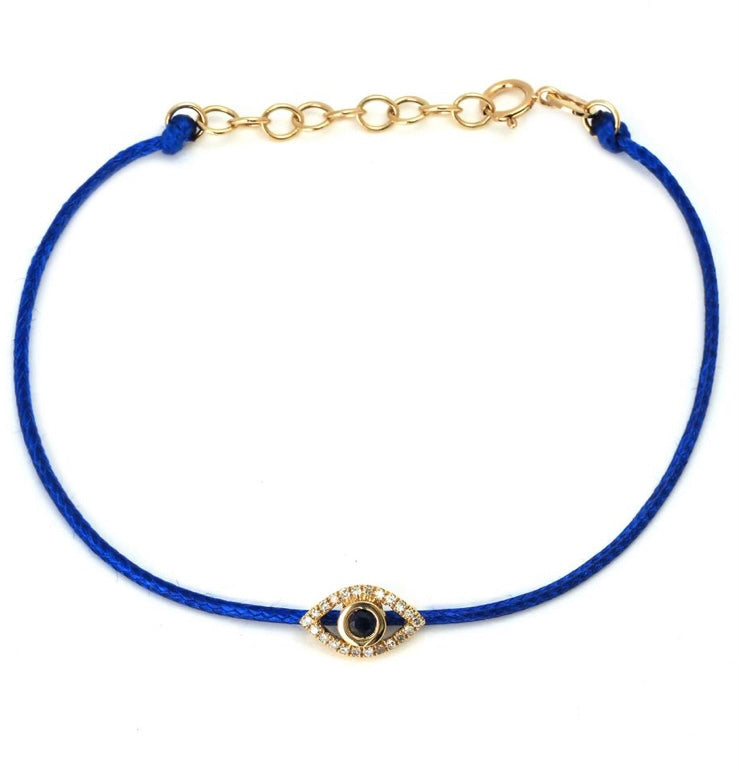
The blue ojo bracelet is one of the, if not the most, popular and symbolic jewelry amulets in the world. It’s so popular that it even has its own emoji: 🧿.
You’re probably asking yourself, but what does the blue ojo bracelet mean? This article will explain how this blue eye of protection became such a powerful symbol across different continents, peoples, and languages.
BLUE MAL DE OJO BRACELET MEANING
Given its popularity and adoption across humanity, throughout various cultures and religions, the evil eye can have different meanings and interpretations. For the purpose of this article, we’ll mainly focus on mal de ojo as it’s perceived across Spanish-speaking geographies, like Spain and Latin America, Mexico, and Puerto Rico.
Ojo is the Spanish word for “eye.” It can refer to mal de ojo, “evil eye,” ojo Turco, “Turkish eye,” or ojo Griego, “Greek eye.” The blue ojo is the most traditional color found across the world. It’s used as a talisman for protecting against negative harmful energies.
A blue mal de ojo bracelet protects from such evils and is a source of empowerment and calm. It’s believed to protect the wearer from the evil eye’s curse by deflecting the evil glare back to the person who sends it.
There exist many other ojo colors with different meanings and significance. For example, in addition to repelling negative energies, the black ojo also symbolizes power, strength, and serenity.
MAL DE OJO ORIGINS
The ojo amulet itself is typically referred to as an ojo Turco and not a mal de ojo in Spanish. It’s because the evil eye carries negative energies and the Turkish eye deflects them.
Spanish speakers refer to the ojo as either Turco or Griego largely in part to the geographical origins of the evil eye legend. It’s in Turkey where the evil eye is most widespread—hence the Turco namesake in Spanish.
The evil eye is thought to have emerged from Mesopotamia, which later became the Ottoman Empire. Today, it’s now largely the area of the Mediterranean that overlaps with modern-day Turkey and Greece. The mal de ojo’s original name and what it’s still referred to as in much of the world is Nazar. Nazar means “look” in the Arabic language.
It is believed that in Turkey, and other Muslim countries, blue is thought to be the most powerful color of protection. In places like Morocco and Algiers, it’s common to find blue eyes on horses and camels.
Even today, in the Aegean region, blue is supposed to bring good fortune; this is why the doors of the houses and the roofs of the churches in the Greek islands are blue. In Greece and Armenia, children wear blue eye beads on their clothing.
Blue-eyed invaders
The theory is because, in those lands of predominantly dark-eyed people, blue eyes are foreign and suspicious. Therefore, blue attracts the evil glance to itself rather than the person wearing it.
One version of the origin story credits blue-eyed Nordic invaders of what today is known as Turkey. The population being overrun and invaded by these northern enemies associated their blue eyes with evil, which started the use of the symbol as protection against such forces.
For many still today, avoiding contact or distancing from people with blue or light eyes and blonde hair continues to be a method for warding off the evil eye.
MAL DE OJO IN HISTORY
Evil eye beliefs exist in almost every culture across the world.
References to the evil eye have been found in cave paintings and medieval historical records. The existence of this ancient belief is present throughout all of human history.
It is mentioned in the Bible as well as in Sumerian and other ancient texts, making it more than 5,000 years old. Warding off harm from evil gazes and maligned praises has been a challenge for humanity since the dawn of man.
From the 16th to 18th centuries, you could’ve been executed, and often were, if your cat became ill. This passed as evidence for being guilty of possessing evil eye powers.
Fortunately, the mere allegation that you have mal de ojo is no longer a serious threat in the 21st century.
MAL DE OJO TRANSMISSION
It’s generally believed that mal de ojo is inflicted by someone wishing to do you harm, through their gaze, praise, envy, and jealousy. However, in parts of South America and Mexico, the act of giving the evil eye, or to ojear or to echar mal de ojo, can be an involuntary act. In this case, the inflicter is unaware.
Almost always, targets of mal de ojo are unsuspecting and unaware themselves. This underscores the importance of protection against mal de ojo since it’s nearly impossible to detect. For this reason, mal de ojo jewelry adorned with an ojo amulet, like bracelets, is commonly worn for protection.
MAL DE OJO SIGNS AND SYMPTOMS
The signs of mal de ojo are usually associated with bad things happening to someone or something. It’s often seen as a serious curse that can cause everything from illness, death, bad luck, and injury in humans and animals.
This only occurs when the person or thing isn’t protected by wearing a special amulet, like a blue ojo bracelet, for example.
The effects of mal de ojo aren’t limited to conscious beings either. Inanimate objects and material possessions that are looked at with jealousy or envy are also susceptible to failure, damage, or worse.
Physical symptoms can include everything from loss of appetite to weakness, stomach ache, trouble sleeping, fever, nausea, eye infections, lack of energy, and mood swings.
Environmental symptoms can include problems with family or finances or personal problems as simple as a car breaking down or getting a flat tire.
MAL DE OJO IN CHILDREN AND BABIES
A common belief amongst Spanish-speaking cultures finds children and babies, especially newborns, to be particularly at risk of the curse. Since mal de ojo can be transmitted through admiration and praise, often unknowingly, infants are found to be especially vulnerable.
In many of these cultures, it’s customary to touch a newborn while giving it praise or admiration. This is believed to avoid cursing them with mal de ojo.
For these reasons, it’s very common to find children and infants wearing jewelry with amulets, like the blue ojo bracelet, for protection. This practice is found all over the world with different materials and objects, but even amongst Spanish-speaking cultures, you find variety.
In parts of South America, for example, red ribbons are attached to babies, animals, or objects as protection. It’s believed that the red ribbon will attract the evil gaze and protect the person or thing wearing it.
In Puerto Rico, the most commonly used protection is from an entirely different form of amulet jewelry called Azabache bracelets. Like the blue ojo bracelet, the Azabache bracelet is also usually adorned with a black, or sometimes red, amulet. This amulet, however, is not an ojo but is in the shape of a fist with an extended index finger knuckle.
MAL DE OJO CURES AND TREATMENTS
For the unfortunate souls unprotected by a blue ojo bracelet or another type of amulet jewelry (or red ribbon), they may contract the curse. When this happens in Spanish-speaking cultures, it’s customary to visit a traditional folk healer, like a shaman, for treatment. In much of Latin America, they’re known as curanderos.
The most common mal de ojo treatment found in these cultures is a raw chicken egg.
A healer will typically pass an egg over the victim’s body to absorb the mal de ojo away from them. The egg is cracked into a bowl of water and then placed under the victim’s bed near their head. Later, if the egg appears to look cooked, then that is evidence that the victim had mal de ojo and is cured.
Some cultures have a variation where they pass the egg over the victim in a cross shape while reciting The Lord’s Prayer.
Other cultures believe that mal de ojo can be cured if touched by the person who transferred it to you with their gaze. Since mal de ojo transmission can be involuntary, if it’s suspected that someone became cursed after a person stared at them, having that same person touch the cursed person will release the bad energy.
BLUE MAL DE OJO BRACELET RULES
How do you bless your ojo?
Some cultures might differ on the exact steps needed to properly activate an ojo.
Most of the Latinos we surveyed agreed on the following steps needed to activate one’s blue mal de ojo bracelet for protection:
- Cleanse your talisman in a mixture of clean water (preferably rainwater) and sea salt.
- Dry your talisman with a clean cloth made only from natural fibers. Natural fibers help ensure your ojo’s purification.
- Energetically charge your talisman under the light of a full moon by leaving it outside overnight.
- Place lit candles around your talisman to help repel any negative energy absorbed during its long energy exposure.
- Congratulations! Now your blue mal de ojo bracelet is blessed, activated, and ready for protection against the evil eye.
Which hand does the bracelet go on?
We can’t find any agreement as to whether the hand that you wear your blue mal de ojo bracelet on matters. The ojo can be worn in a variety of ways, on different types of mal de ojo jewelry and accessories.
Our research suggests that it is appropriate to wear your blue mal de ojo bracelet on either hand or wrist.
You should be protected as long as your ojo is visible. Your ojo will reflect and repel negative energy or envy if it can be seen.
Some limited sources state that the ojo should be worn on the left hand or wrist. According to passages in the kabbalah, the left side of the body symbolizes the side of reception for the body and soul.
Ultimately, we recommend you decide what’s best for you and your protection. We believe that wearing a blue mal de ojo bracelet on the “wrong” side is better than not wearing anything at all.
Of course, proceed with caution or consult with your spiritual teacher for advice if you’re unsure.
You might also consider different mal de ojo jewelry or accessories for protection. Other options might include mal de ojo necklaces, mal de ojo rings, mal de ojo earrings, mal de ojo charms, or mal de ojo pins.
What does it mean if your ojo breaks?
It is believed that once your ojo bracelet cracks or breaks, it has fulfilled its purpose and protected you from as much negative energy as it can handle. Glass is the preferred and most common material for blue ojos, because they break once they’ve reached their limit.
Remember to always inspect your blue mal de ojo bracelet before and after every use.
It’s very important to understand that once an ojo bracelet cracks or breaks, it’s no longer effective as a source of protection. You should immediately replace it with a new ojo after this happens. Make sure you follow the same steps above to activate, bless, and purify your new ojo.
For some, their ojo might never crack or break. This is seen as good fortune since no one envies you or wishes you harm.
Nonetheless, you can feel more secure knowing that you have it there for protection just in case.
Can you purchase a blue mal de ojo bracelet for yourself?
Traditionally, mal de ojo jewelry has been understood to be for gifting to others who need protection. Popular examples include pregnant mothers and newborn babies.
Some might believe that it’s unlucky to purchase mal de ojo jewelry for yourself. We haven’t found evidence of that being true.
Gifting someone a blue mal de ojo bracelet is a wonderful gesture of protection for someone you love.
Especially if they’re starting a new journey or chapter in their lives. For example, starting a business, moving to a new place, going on vacation, pregnancy, illness, sickness, etc.
While it might feel nice to be gifted mal de ojo jewelry, don’t worry if it doesn’t happen. Purchasing a blue mal de ojo bracelet for yourself will still provide you with the same protection.
What happens if a blue ojo bracelet is stolen?
If an ojo is stolen, it is believed that whoever steals it absorbs all of the negative energy that has been picked up by the amulet. Clearly, it’s not advisable to steal one if you don’t want bad luck—or worse.
WHERE TO BUY A BLUE OJO BRACELET?
At Not Those Carrots, we’re fans of gold karats and diamond carats. So of course we’re drawn to evil eye bracelets that meet those criteria.
We want to present you with some of our favorite blue ojo bracelets.
Top Pick
SILLY SHINY DIAMONDS – Evil Eye Diamond Bracelet With Blue Sapphire
- Handmade item
- Natural diamonds, 0.35 carat, F color, VS clarity.
- Center of the eye blue Sapphire.
- Available in 14K yellow gold, 14K white gold, and 14K rose gold.
DIANE KORDAS – Evil Eye diamond, sapphire & cord bracelet
Intricately woven from glossy cord in Greece and adorned with pavé-set brilliant-cut diamonds totaling 0.27ct alongside 0.05ct of sapphires, then finished with a sliding knot.
- COLOUR: Blue
- COMPOSITION: Cord.
- PLACE OF ORIGIN: EU
- Brilliant-cut pavé-set diamonds totaling 0.27ct
- Round-cut pavé-set sapphires totaling 0.05ct
- Sliding knot
SELDA JEWELLERY – Navy Blue Evil Eye Hand Bracelet in 14K Rose Gold
- Creator: Selda Jewellery
- Metal: 14k Gold, Rose Gold
- Stone: Diamond
- Stone Cut: Brilliant Cut
- Ships from Istanbul, Turkey
AARON BASHA – Vermeil Beaded Navy Blue Evil Eye Bracelet & an additional plain matching bracelet
- Gold Vermeil is 18K Gold-Plated
DAZZLE JEWELRY & CO – 14K Evil Eye Cord Bracelet
- Adorned with .07 carats of blue sapphires and .07 carats of diamonds with 14K gold and blue cord.
